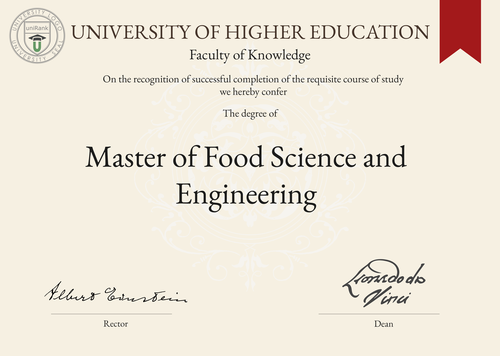
Master of Food Science and Engineering (M.F.S.E.)
Guide to Master of Food Science and Engineering Program/Course/Degree
Master of Food Science and Engineering (M.F.S.E.)

Program Name:
Master of Food Science and EngineeringProgram or Degree abbreviation:
M.F.S.E.Duration range:
Varies by country and university, typically 1-2 yearsTuition range:
Varies by country and university, typically $10,000-$30,000 per yearOverview:
The Master of Food Science and Engineering program is designed to provide students with advanced knowledge and skills in the field of food science and engineering. This interdisciplinary program combines principles of food science, engineering and technology to address the challenges and opportunities in the food industry.Curriculum Overview by year:
- Year 1: Core courses in food chemistry, food microbiology, food processing, food engineering and food safety. - Year 2: Specialization courses in areas such as food product development, food quality assurance, food packaging and food regulations. Research project or thesis.Key Components:
- In-depth understanding of food science principles and their application in the food industry. - Hands-on experience in food processing techniques, food analysis and quality control. - Knowledge of food engineering principles and their application in food production and processing. - Understanding of food safety regulations and practices. - Ability to develop and innovate food products.Career Prospects:
Graduates of the Master of Food Science and Engineering program can pursue various career opportunities in the food industry. They can work in food manufacturing companies, research and development organizations, government agencies and consulting firms. Possible job roles include food scientist, food technologist, quality assurance manager, product development specialist and food safety auditor.Salary Expectations:
Salaries for professionals with a Master of Food Science and Engineering degree can vary depending on factors such as location, industry and experience. On average, graduates can expect a starting salary of $50,000 to $70,000 per year. With experience and career progression, salaries can range from $70,000 to $100,000 or more. For a more accurate understanding of salary expectations, you can utilize the Job Sites Search Engine, from our sister site jobRank, which searches over 4,600 job sites worldwide. Make sure to specify not only the job title but also the country you are interested in.Conclusions:
It is important to note that the duration, tuition fees, curriculum, key components, career prospects and salary expectations of the Master of Food Science and Engineering program can vary depending on the country or location where you choose to study, as well as the university you select. Therefore, it is recommended to research and compare different programs and universities to find the best fit for your goals and preferences. Visitors interested in pursuing a Master of Food Science and Engineering degree can use the uniRank World Universities Search Engine to search for universities offering this specific degree anywhere in the world. This tool will help you explore various options and make an informed decision about your education and future career in the field of food science and engineering.World Universities Search Engine
search for Master of Food Science and Engineering (M.F.S.E.) and add the Location (country, state etc.) or specific University you are interested in studying at.
Query examples:
- Master of Food Science and Engineering (M.F.S.E.) United States
- Master of Food Science and Engineering (M.F.S.E.) United Kingdom online
- Master of Food Science and Engineering (M.F.S.E.) Australia international students
- Master of Food Science and Engineering (M.F.S.E.) University of California
- Master of Food Science and Engineering (M.F.S.E.) University of London tuition fees
- Master of Food Science and Engineering (M.F.S.E.) University of Sydney scholarships
Share Program/Course
Interesting? Share this program/course/degree info with your friends now.